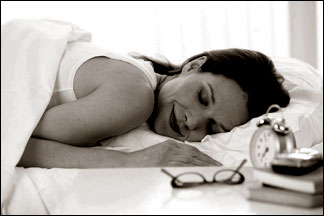|

Sleep like a baby
Having trouble getting restful sleep at night? Dr. N.
Ramakrishnan writes about overcoming this problem.
SHAJU JOHN
 Most people take sleep for granted and fail to observe some simple
and healthy habits that help get a restful sleep. Our health and ability
to succeed depend on how we meet our bodyís need for rest and quality
sleep. Most people take sleep for granted and fail to observe some simple
and healthy habits that help get a restful sleep. Our health and ability
to succeed depend on how we meet our bodyís need for rest and quality
sleep.
There can be a wide variation in the amount of sleep required for
individuals. Most of us require an average of 6-8 hours. The following
are some common sleep hygiene measures.
Regular bedtime
Although this may not always be practical, remember that your body
likes regular routines. This may not be very exciting but it is
comfortable. So pick a reasonable and regular time to go to bed each
night and stick to it.
Even if you donít think you are tired when the time comes, your body
will appreciate it. After a while, when it feels it can rely on the
routine, it will repay the favour by letting you go to sleep when you
want. On the same lines, get up at the same time every day, even on
weekends and holidays.
Once youíre awake, get up. Donít lie in bed thinking about getting
up.Keep your sleep environment comfortable
Keep the bedroom quiet and as dark as possible when youíre sleeping.
Make sure you sleep in a well-ventilated room. Fresh air and optimal
room temperature are the best sleeping conditions. Sleep on a good firm
bed that will give the body the support it needs.
Identify bed with sleep
Do not work, read, watch television or work out crossword puzzles
while lying in bed. If you canít sleep, get out of bed. Donít lie awake
trying to get sleep any longer than 30 minutes. If you canít sleep in 30
minutes, get out of bed. Do something quiet and non-stimulating. When
you feel tired, go back to bed.
Avoid stimulants
Preferably avoid coffee, alcohol and tobacco completely. If not at
least four to five hours before bedtime. If you are used to them for a
long time, it is not wise to stop them abruptly as withdrawal symptoms
can disrupt your sleep pattern. Discuss it with your doctor and withdraw
them slowly.
Sleeping full stomach
Itís a healthy habit to have dinner at least two to three hours
before bedtime. This will ensure that you donít have a full stomach when
you sleep and also prevent acid reflux (heartburn).
Be active during the day.
Get some physical exercise on a regular basis, preferably in the
morning. Regular exercise improves restful sleep. This includes walking,
stretching and aerobic exercise.
People who work more with their minds have far more trouble with
insomnia than people who do physical work. Itís best to avoid daytime
naps. If youíre really having trouble sleeping at night - and youíre not
a senior citizen who sleeps for small periods of time - skip naps.
Youíll be more tired at bedtime and be able to fall asleep. Do not
exercise just before going to bed, as it can be detrimental to your
sleep.
Relaxation techniques
Only you will know what is relaxing to your body and mind. Some
common relaxation techniques that have proven to be beneficial are warm
baths, massage, yoga, listening to music and meditation.
Decide what works best for you. Take a warm bath a few hours before
bedtime.Itís a great way to relax the body. But donít overdo it. You
want to relax not exhaust your body. Play some soft soothing music that
will lull you to sleep.
If after trying these measures, you still have problems like
insomnia, non-refreshing sleep, daytime fatigue or significant snoring,
consult a doctor and get appropriate treatment.
The most common cause of insomnia is a change in your daily routine.
For example, travelling, change in work hours, disruption of other
behaviours (eating, exercise, leisure).
Sleep pattern disruption may also be a result of tension, stress and
anxiety or be a symptom of other physical disorders.Of course, the more
anxious we get about our insomnia, the worse it gets.
Problem for boys
 What is Hypospadias? What are the problems it causes? Dr. Ramesh Babu
Srinivasan explains. What is Hypospadias? What are the problems it causes? Dr. Ramesh Babu
Srinivasan explains.
Baby boys pass urine like a fountain. Small boys can pass urine
straight.
The urine comes out from the tip of the penis. In boys with
hypospadias, the opening is on the under surface of penis and so the
urine is directed down towards their feet.
Hypospadias occurs in one in 300 baby boys. The following features
point to it:
* Urine coming from the under side of the penis
* Penis being slightly bent downwards
* Excess foreskin on the top of the penis
When hypospadias is left uncorrected, it can cause problems. Unlike
the normal boys who can stand and pass urine, these children have to
sit. If they stand, it goes down the leg.
As adults, their chances of having children are much lower, as they
canít deposit the sperm normally. Sometimes the urinary opening is
small, leading to blockage in urine stream leaving them at a risk of
urinary infection.
In general, hypospadiac children do not have other kidney
abnormalities.
However, in 10 per cent of these kids, the testis may not be
descended normally. When both testes have not come down normally, they
can have associated hormone defects.
When the first child or the father has hypospadias, there is a
slightly higher chance (7-10 per cent) for the siblings to have the same
birth defect.
>From six months onwards, hypospadias can be corrected by an
operation. By operating before two years, these children can be toilet
trained like any other child.
It is also essential for boys to appear like others when they go to
school, to grow without emotional problems. Most cases are mild and
require a single stage operation. When the opening is too far down from
the tip, it might require a two-stage operation.
The operation is usually done under general anaesthesia and a
catheter/dressing is left for 5-7 days. Three things are corrected:
* The opening is brought to the tip
* The penis is straightened
* Excess foreskin is removed (circumcision)
Optical magnification (microscope) and fine suture materials are used
to provide a successful result. When extra care is taken there is a very
good success rate.In five per cent the following complications can
occur: The new opening gets small gradually (meatal stenosis), Urine
leaks at the original site (Fistula). Both can be corrected by another
minor operation; so the parents need not be unduly concerned.When the
problem is corrected by 1-3 years of age with a good outcome, there
should be no problem in future.
How to avoid dying from a heart attack
Dr. R. A. R. Perera, Consultant Clinical
Psychologist
Should you ever collapse, suddenly and critically ill, somebody other
than a doctor will most probably decide not only whether or not you are
dead, but also whether or not you live. When one person finds another in
a state of collapse, a decision must be made as to whether the collapsed
person.
* Requires no help because he or she merely seems to be Ďillí (drunk,
hypochondriac, malingering etc.)
* Needs help urgently
* Is dead
Placing a victim in the first category allow the passer-by to move on
without taking action. Use of this category account for the low level of
helpfulness.
The decision that medical attention is needed urgently usually means
that resuscitation attempts begin immediately. If the victim is assumed
to be dead resuscitation attempts are virtually non existent.
The category in which the collapsed person is placed depends
importantly on social factors. For example, age may have a major
influence over the categorization process. The older the patient, the
more likely that his or her lack of vital signs of life will be taken at
face value - the person is assumed to be dead.
However, the same lack of vital signs may be viewed as Ďcardiac
arrestí if the person is younger, and resuscitation attempts may
commence immediately.
In an experiment conducted from the patients who were brought in a
collapsed state to the Royal Free Hospital Medical School of London
University, only thirty percent of old people (age 75-80 years) were
resuscitated. But energetic attempts were made to save the lives of all
hundred percent of the young (age group between the ages of 35-43
years).
Another factor that may determined the category into which people are
placed is presumed moral character. Alcohol use, especially by someone
dressed shabbily or unwashed, leads to an assumption that the person is
merely drunk and little help is furnished.
Alcoholics, drug addicts, prostitutes, vagrants, persons injured in
fights, homosexuals, and attempted suicides are less often judged as
needing urgent attention. Hospital medical personnel seem to feel that
such persons are less deserving of help than those of higher moral
character are.
In many instances of suicides who requires stomach pumping the
hospital staff will make commends like Ďthis will teach her a lessoní or
Ďmay be now.
In contrast a person who is successful in societyís standards usually
receives rapid and continuous help.So to avoid dying from a heart
attack, look as young as you can, and dress well, disguise your
deviancies, and keep your breath fresh.
Chewing gum aids bowel recovery
Chewing gum aids recovery from bowel surgery, mounting evidence
suggests.
The latest work published in Archives of Surgery reviews data from
five recent trials involving 158 patients.
 Chewing gum appears to speed up the return of normal bowel function
by stimulating nerves in the digestive system, say the UK reportís
authors. Chewing gum appears to speed up the return of normal bowel function
by stimulating nerves in the digestive system, say the UK reportís
authors.
Trials are now needed to see if this, in turn, can reduce the
recovery time needed in hospital, the London-based team from St. Maryís
Hospital say.
In each study, a group of patients chewed sugarless gum three times
per day following surgery for a period of five to 45 minutes and were
compared with patients who did not chew gum.
Chewing is a bit like eating and it starts peristalsis, which is the
movement of the bowel * An advisory nurse for Bowel Cancer UK Patients
who chewed gum passed gas and had a bowel movement sooner than those who
did not chew gum - signs that their bowel function returned sooner.
Any type of abdominal surgery can slow down or halt bowel function -
a condition known as ileus, which can cause serious complications.
In four of the trials, the length of hospital stay after an operation
was also a day shorter for the patients who chewed gum. But the
researchers say more work is needed to see if this is a direct link
rather than a chance finding.
If chewing gum did reduce hospital stay, this could save the NHS
millions of pounds, say the researchers, given that more than 31,000
bowel operations are carried out in England each year and an overnight
stay in hospital costs the NHS around £200.
An advisory nurse for Bowel Cancer UK said: ďChewing is a bit like
eating and it starts peristalsis, which is the movement of the bowel.ď
Ileus - when the bowel is slow to start working again - can occur after
an operation, but it has become less common as surgery has become more
refined.
ďThere is some evidence that chewing gum might help, but not enough
that bowel surgery patients are routinely being advised to chew gum.Ē
Story from BBC NEWS: |
